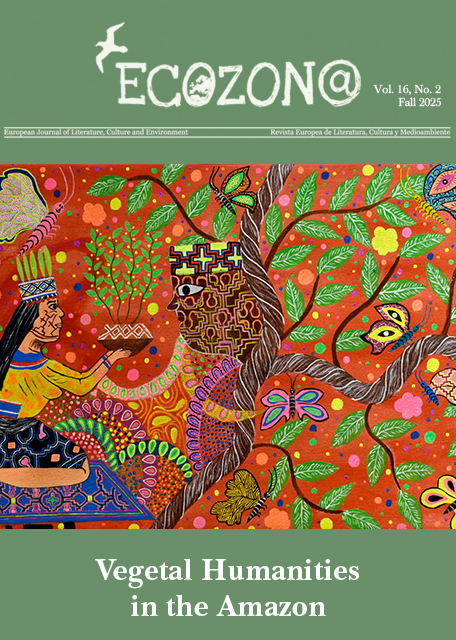<b>The Ecopoetics of Survival: The <i>Transborder Immigrant Tool</i> and <i>The Desert Survival Series</i></b> // La ecopoética de la supervivencia: <i>Transborder Immigrant Tool</i> y <i>The Desert Survival Series</i>
DOI:
https://doi.org/10.37536/ECOZONA.2019.10.1.2857Parole chiave:
Design, randomness, poetry, poetics, ecology, georgic, pastoral, border, desert, migrants // Diseño, aleatoriedad, poesía, poética, ecología, geórgicas, pastoril, frontera, desierto, migrantesAbstract
The Desert Survival Series (2010, 2014) by Amy Sara Carroll, a set of poems that forms part of an activist project called the Transborder Immigrant Tool, departs from the methods of both radical political poetry and some avant-gardist forms of aesthetic resistance that rely on a poetics of randomness to challenge the prevailing order. Instead, the DSS employs design—the design of the poetic object revealing other designs—as a political resource. It addresses a group endangered and abjected by the United States government: migrants crossing the Sonora desert. In doing so, it recalls traditional forms such as the pastoral and the georgic in order to reimagine earlier attitudes toward poetic making, hierarchical politics, and the environment. Orienting in their address to migrants, disorienting and counterintuitive with reference to their contemporary poetic context, the poems are of interest for debates around ecopoetics, because they make an intervention in the domains of environmental poetry as well as political activism of the border.
Resumen
La serie Desert Survival (Supervivencia en el desierto) (2010, 2014) de Amy Sara Carroll, un grupo de poemas dentro del proyecto artivista llamado Transborder Immigrant Tool (La Herramienta del Inmigrante Transfronterizo), se aleja de los métodos tanto de la poesía política más radical como de algunas formas de vanguardistas de resistencia estética dependientes de una poética de lo aleatorio para desafiar el orden predominante. En su lugar, la serie Desert Survival utiliza el diseño—el diseño del objeto poético que revela otros posibles diseños—como una herramienta política. Esta enfocada a un grupo en peligro y vilipendiado por el gobierno de Estados Unidos: los migrantes cruzando el desierto de Sonora. De esta manera, recupera formas tradicionales como el género pastoril y las geórgicas para reimaginar actitudes pasadas hacia la creación poética, la política jerárquica y el medio ambiente. Los poemas están dirigidos a orientar a los migrantes, aunque su vocación en el contexto poético contemporáneo es desorientadora y contraintuitiva. Son poemas interesantes en los debates de lo ecopoético, pues postulan la intervención de la poesía sobre el medio ambiente al igual que sobre el activismo político en la frontera.
Downloads
##submission.downloads##
##submission.additionalFiles##
Pubblicato
Fascicolo
Sezione
Licenza
Authors who publish with this journal agree to the following terms:
a) Authors retain copyright and grant the journal right of first publication with the work simultaneously licensed under a Creative Commons Attribution License that allows others to share the work with an acknowledgement of the work's authorship and initial publication in this journal (CC BY-NC for articles and CC BY-NC-ND for creative work, unless author requests otherwise.
b) Authors are able to enter into separate, additional contractual arrangements for the non-exclusive distribution of the journal's published version of the work (e.g., post it to an institutional repository or publish it in a book), with an acknowledgement of its initial publication in this journal.
c) Authors are permitted and encouraged to post their work online (e.g., in institutional repositories or on their website) prior to and during the submission process, as it can lead to productive exchanges, as well as earlier and greater citation of published work (See The Effect of Open Access).










